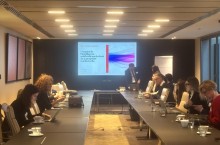CIO en VO : le gouvernement américain nomme son DSI

Vivek Kundra vient d'être nommé CIO du gouvernement américain avec comme ambition de bouleverser les pratiques de l'administration : adoption massive des "pratiques 2.0" et des technologies comme facteurs d'efficacité.
PublicitéThe U.S. government's first CIO, Vivek Kundra, introduced himself Thursday as someone who will act aggressively to change the federal government's use of IT by adopting consumer technology and ensuring that government data is open and accessible. Kundra also wants to use technology such as cloud computing to attack the government's culture of big-contract boondoggles and its hiring of contractors who end up "on the payroll indefinitely." Kundra, in a conference call Thursday with reporters shortly after President Barack Obama named him as federal CIO said one of his first projects is to create a data.gov Web site to "democratize" the federal government's vast information treasures by making them accessible in open formats and in feeds that can be used by application developers. "How can we leverage the power of technology to make sure the country is moving in the right direction?" asked Kundra, stressing that his ambition is to "revolutionize technology in the public sector." Kundra was expansive about his tech goals and critical of the government's contracting record for IT projects that "frankly haven't performed well," saying there have been few consequences for failures. While he outlined a tough approach with contractors, Kundra also wants to move the government away from its dependence on big IT contracts. He pointed to cloud-based services used by the private sector to quickly create and provision development platforms, as well as for information sharing, such as for photos and videos. "Yet, you look across the federal government, and we don't have a single platform that allows you do that," he said. When it comes to information sharing and finding new ways of engaging the public, Kundra spoke highly of Facebook and sees it as a potential model. Facebook Inc.'s 140 million users have "been able to self-organize on issues, on policy, on problems and create a movement so people can be heard," said Kundra. "We have the ability to run an open, transparent, participatory and collaborative government." By making federal data accessible, Kundra wants to enable developers to build applications "in a context-rich model" that can help the government and private sector as well develop new products -- and even new kinds of applications that might be used on smartphones. To illustrate the potential, he cited the work of the National Institutes of Health Human Genome Project, which identified genes in human DNA. Its research, available online, helped spur the creation of new drugs, he said. However, Kundra also noted that achieving this vision will take considerable work. Kundra, who before this appointment served as chief technology officer of the District of Columbia, previously held a technology post with the commonwealth of Virginia. He does not have a long résumé and will likely face daunting challenges trying to steer a technology direction for federal agencies that are now spending about US$71 billion per year on technology. In his role as D.C.'s CTO, Kundra built a reputation as someone willing to push into new directions. The district has been aggressive in making data available to the public, and it now offers some 240 feeds providing a range of data from the local government, including crime reports and building permits. The data has been used by local bloggers to help provide neighborhood information, as well as by commercial developers. To encourage the use of government information, Kundra created a contest called Apps for Democracy last year that invited developers to come up with innovative ways to use the feeds. Peter Corbett, the CEO of iStrategyLabs, a Washington-based marketing and development firm, worked with Kundra to develop the Apps for Democracy contest. Corbett said Kundra told him that he wanted to move away from a model of hiring "an expensive government contractor" to build technologies based on the feeds and instead try to "engage the talented citizens of not only in the D.C. area but nationally and internationally." The contest resulted in Web and mobile applications used to help people find parking and tourists explore the city, among others. Patrick Thibodeau - © 2009 Computerworld Inc.
Article rédigé par
ComputerWorld USA
Partager cet article
Articles à la une










Commentaire
INFORMATION
Vous devez être connecté à votre compte CIO pour poster un commentaire.
Cliquez ici pour vous connecter
Pas encore inscrit ? s'inscrire